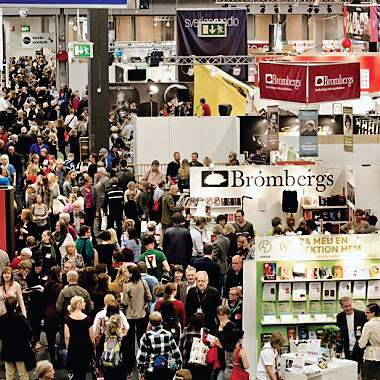Frankfurt Book Fair
G Olivannan, Treasurer, Book Sellers and publishers Association of South India regularly attends the Frankfurt Fair. He says, ‘the exuberance and enthusiasm which was missing in the last few years of FBF, has resurfaced’. We bring Book Link readers this veteran publisher’s assessment of the Fair.It took place from 11-15 October 2017 with 125 countries participating. There were 278,023 visitors, with trade visitors numbering 172,296.From day one, the stands were buzzing with negotiations and contracts and trade visitors dashing around all day to meet contacts, smiling, cheerful faces seen everywhere.T he last two days of the 5-day fair, a weekend, was open for the public. On those days the turnout was huge and the entire fairground wore a carnival look with a variety of amusements to enthrall the crowd.
The Indian publishers largely focused on children’s book which is a safe bet in all weathers. The Indian languages are still far from being considerable in this huge fair. Tamil publishing industry is no better and was insignificant. While books from recently originated languages with relatively new or unknown literatures find a place, a classical language rich in literature is yet to take off on the international arena. The biggest challenge for Indian language publishers is identifying quality translators and meet the International quality. There are ways to overcome this issue, as there are internationally acclaimed editors available to polish works to meet the standards. It is high time we produce quality translators, a most sought-after profession and highly lucrative; in some instances, translators have earned more than the publisher or writer.
Kannan Sundaram of Kalchuvadu Pathippagam, a regular participant at the Frankfurt book fair says that ‘Tamil Publishers need to think out of the box’. Ninety per cent of them tread carefully and are contend publishing popular titles like Ponniyin Selvan. It is shame that more than thirty publishers have the same book published year after year. Very few in the industry are innovative and risktakers, Kannan adds. (Ponniyin Selvan is a 2400-page 20thcentury Tamil historical novel written by Kalki Krishnamurthy.)
Frankfurt Book fair, the largest, is a place of opportunity for writers, publishers, sellers, translators and all other allied services in connection with publishing. If only we understand the rules of the game played here, things will fall into place. Even in this highly digitalised world, where communication is instant, for the participants at the fair ‘seeing is believing’. They prefer to meet their contact at least once. Therefore, it is imperative to make a visit, this is the first and foremost rule of the game.
There are very many countries that offer funding for translation and publishing. They do invite publishers, authors and translators to their country at their expense to interact with their writers and publishers. A publisher has to look out for internationally award winning tiles, not only the big ones like Man Booker or Pulitzer, there are scores of other awards. The best bet would be European languages and once narrowed down, publishers should look out for their presence at Frankfurt fair.
Publishers from European countries apart from individual stands, come in a group as a collective stand, either supported by their government or their association. A visit to such stands open the door for many avenues. They provide us with loads of information regarding transalation, funding opportunities and so on. In fact, they would only be too happy to get their books published in Indian languages, particularly, in the classical ones like Tamil, Kanadam, Malayalalam and so on.
Individual participation by taking a stall at the Frankfurt is prohibitively expensive for Tamil Publishers. The Government of Tamil Nadu can play a major role jointly with Booksellers and Publishers Association of South India (BAPASI) by renting a common space in the fair and within it, can divide and allot to interested publishers and authors at subsidised rates.
Each country and each language takes pride in participating at Frankfurt Fair, not necessarily with an eye on commercial considerations; they deem it as their pride to showcase their language and literature to the world. Small countries like Singapore, Malaysia, Thailand decorate their pavilions aesthetically and attractively to woo international buyers. In the process, they subtly promote their tourism too.
India’s National Book Trust of India puts their best efforts year after year to make a noteworthy presence for Indian publishers in the international arena at the India stand. It is time State governments also pitch in to promote their State languages and writers in a big way. The outcome of such efforts may not be immediate, but in the long run the results will be manifold.
Tamil publishers should come out of shell and try innovation. Today, for people of all ages, the world is just their palm held gadgets. It will be a herculean task to get their attention back to books. In such a scenario Tamil Publishers, remaining stagnant, will soon dislodge their position. As Andre Gide said, unless we have the courage to lose sight of the shore we cannot discover new oceans, and let us believe fervently for a change.





